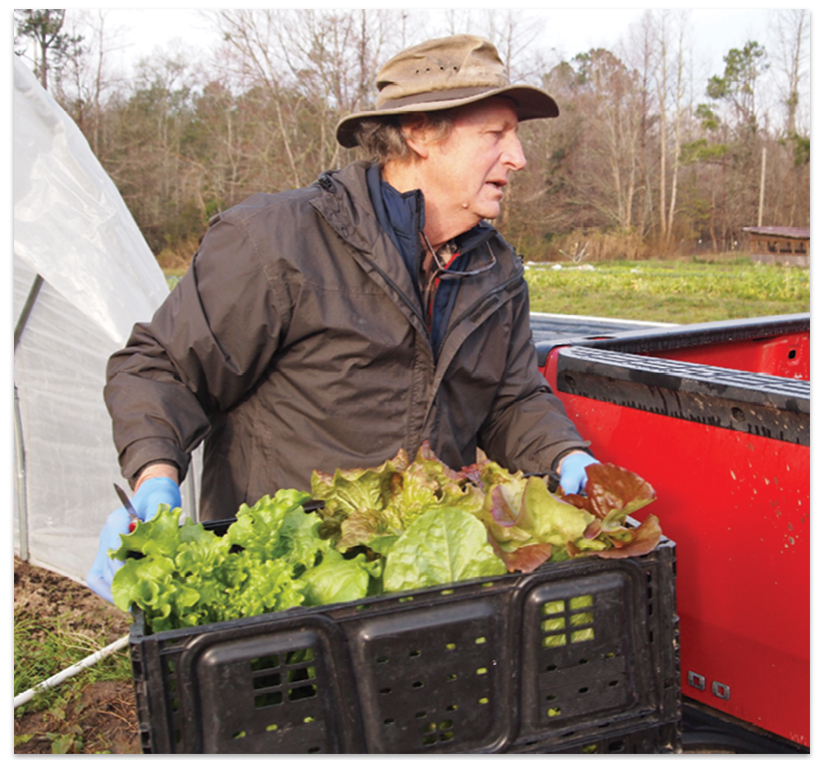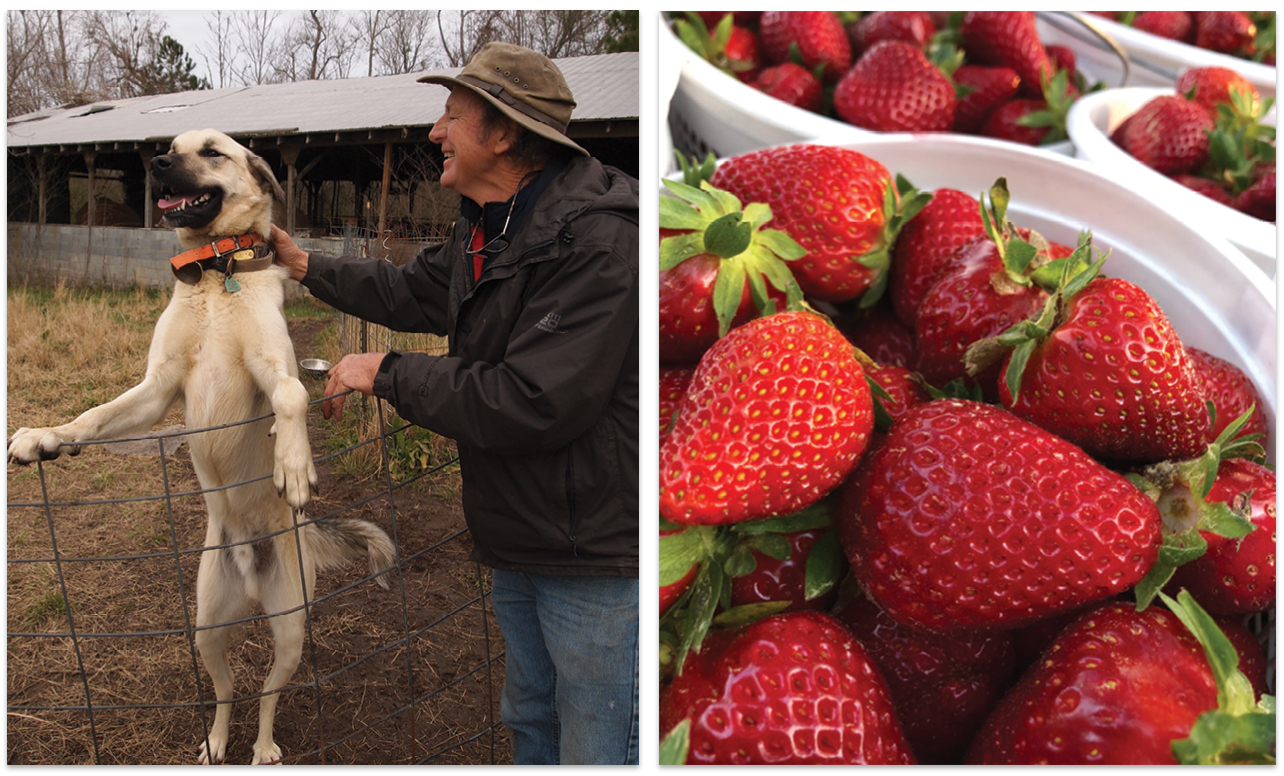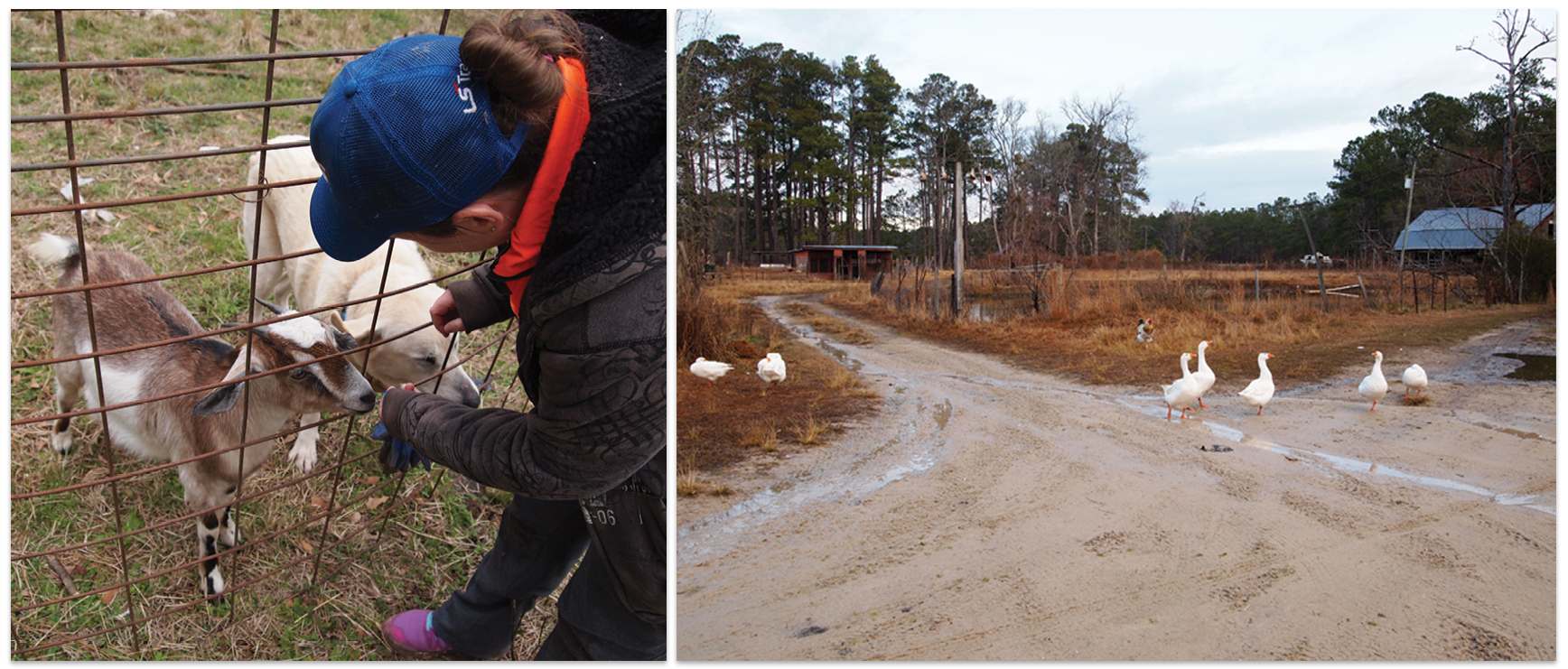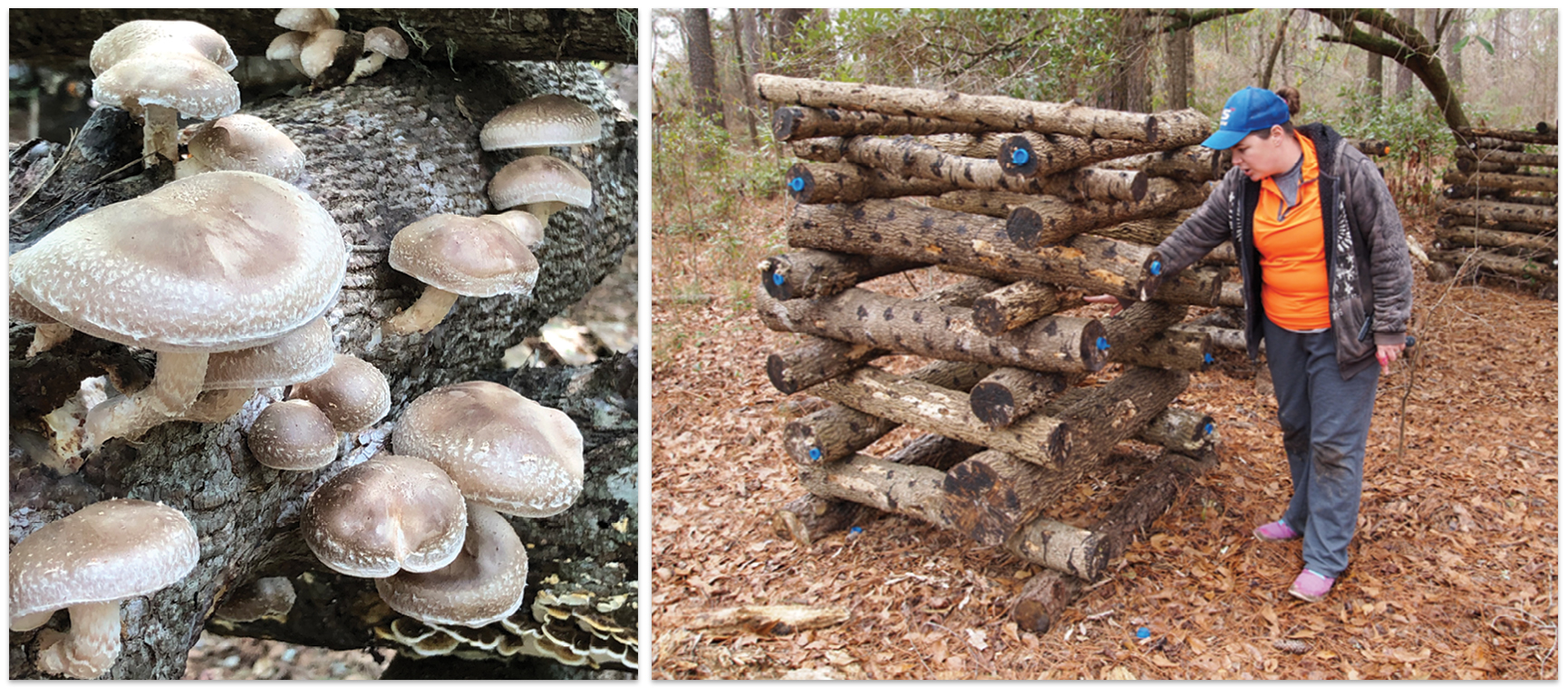A Day in the Life of the Bellamys at the Family-Run Indigo Farms

There was a time, not so long ago, when all of our food was organic, non-GMO and locally sourced; there were no other options. The once ubiquitous U.S. family farm is disappearing as mega farms continue to dominate the agriculture industry, centralizing food production. Around the year 1900, an estimated 40 percent of the U.S. population was made up of family farmers. Today, that estimate is around 1 percent, and many experts agree that’s not such a good thing for the farmers, the food they grow, the environment or our health.
Within just a few generations, natural pest control and fertilizers and ancient agrarian traditions have surrendered to synthetic pesticides and herbicides and tons of harmful chemicals used to grow prettier, bigger and, many say, not as tasty (or healthy) fruits and vegetables. One local family, with roots deep into the soil, is working their patch of ground to reverse this trend, if even just in our little corner of the world. They employ methods from generations earlier, discover new ways of looking at age old challenges and jump through the considerable hoops to become and remain “certified organic.” The work pays off, as they’re finding ready buyers for their produce across the region.
Spending the better part of the day with the Bellamy family of Indigo Farms, which straddles the state line between North and South Carolina in both Horry and Brunswick counties, gave me an eye-opening, encouraging look at one type of food production that has health conscious consumers and foodies alike cheering.
8 a.m.
When I first arrive at Indigo Farms on Hickman Road in Little River/Calabash, the evening’s rain and leftover morning drizzle is dying out. The sun is threatening to peek through the overcast skies as I park and walk to the Farm Market door. Sarah and Sam Bellamy, and their daughter Sallie Lun, greet me, inviting me inside.
Already hard at work, the three are preparing their certified organic produce to take and sell at the weekly Thursday farmers market at the International Culinary Institute of Myrtle Beach, located in The Market Common. They also sell at Myrtle’s Market each Wednesday, Friday and Saturday on Mr. Joe White Avenue in Myrtle Beach, as well as their own market at the farm.
I comment on the very familiar regional surname Bellamy. “We joke that all of us Bellamys are cousins,” says Lun, a new mother, who still manages to work the farm full-time. She’s the next generation to take on the Indigo Farms life, and plans to one day be joined by her husband full-time in the family business. Lun and her family, her parents and grandparents (who are in their 90s), as well as other family members, all live within shouting distance of one another.
“We go back many, many generations,” says 65-year-old Sam Bellamy, who grew up on the farm and can remember helping his parents and grandparents, all farmers before him. “We go back to the 1760s, though I don’t personally go back that far,” he adds with a wink. Bellamy is tall, friendly, soft-spoken and a gentle philosopher. His connection to the land, to this land in particular, is abundantly evident as he talks about the links between family, farming and the organic techniques he brought to Indigo Farms gradually in preceding years.
“My dad was always good about trying new things,” says Bellamy. “We once grew tobacco, had livestock and always something green.” In college, Bellamy was headed toward veterinary school but instead dove head first into the family business. “I didn’t necessarily want to do it the traditional way,” he says. “I just hated spraying the fields on the big tractor.” Over time, Bellamy moved away from his father’s and grandfather’s style of farming, preferring to get closer to the soil, literally. “My daughter in Arizona sent me an article about the science of the soil, and how when you dig your hands into it, the microbes affect your brain and release serotonin. There’s just something healthy about healthy soil. The world is truly amazing, and the tragedy is so many people are not connected to the real world.”

8:20 a.m.
Reminded sharply by Sarah Bellamy, the matriarchal partner in the family business, that there was still harvesting to do, we’re shooed out the door. Sam and I set out in the farm truck to drive a quarter mile to the southernmost Horry County field. I roll down the electric window for a photo and am warned, too late, that the window won’t go back up. I apologize. “Ah, don’t worry about it,” says Bellamy with a tentative smile, gazing skyward. “Good thing the rain has stopped.”
We drive by a large 1.5-acre strawberry patch, which is one of the few tracts in the 90-acre farm not yet certified organic. The Bellamys estimate 75 percent of their crops are grown organically and certified as such, with hopes to one day become certified at 100 percent. In the off-season, the farm supplements their organic crops with local produce not necessarily certified organic, but “grown locally and responsibly.”
Decades earlier, the Bellamys farmed around 200 acres but have reduced the acreage as they become organic. “We’re working on certification for the big [strawberry patch],” says Bellamy, “and in the meantime we employ as many organic methods as possible to make sure the strawberries meet our standards.” A smaller certified organic strawberry patch is serving as the testing grounds as they determine the best path forward. Indigo Farms has long been a popular place to pick your own strawberries and blueberries each spring and summer, and may be remembered for their annual harvest festivals and heritage farm days attended by thousands each year.
We arrive at the “tall tunnels,” which are well-designed, irrigated, open-ended arching greenhouses that allow for year-round growing of vegetables. Within the tunnels, the land and the produce grown is all certified organic, and one look at the bright green lettuces tells you everything is right with this process. The bunches, each a work of art, are as pretty as any bouquet of flowers and are free of pesticides and other contaminates. They’re also free of bugs. “Healthy soil grows healthy plants, and healthy plants naturally repel bugs and disease better than stressed plants,” explains Bellamy, “just like people.”
He pulls a serrated blade from his pocket, reaches low, and cuts a head of romaine lettuce at the base. It’s hearty, perfect, and will be on somebody’s dinner plate later in the evening. He repeats the process countless times, moving on to mustard greens, chard, spinach and a few other varieties of lettuce. The produce is loaded into tubs, thrown on the back of the truck, and will be driven back to the Farm Market, which serves as the gathering spot and hub of the family’s operation.
Before we deliver the goods, we stop to greet Bear, an Anatolian Shepherd, who began barking once he got a look at me. I soon find the dog is as gentle as a teddy bear, though as imposing as a grizzly at over six feet tall when standing on his hind legs. The traditional farming breed dates back to ancient Greece and Turkey. Bred for the purpose, he’s one of four dogs on the farm that serve as natural security against deer, coyotes, rabbits and other critters.
The bond between Bellamy and his dog is undeniable. They greet each other with mutual affection. We drag ourselves from the kennel as Bear pleads for us not to leave, but Sarah Bellamy is waiting for the produce. When we arrive, she is preparing radishes and carrots, also certified organic, bound for the day’s farmers market.

9:16 a.m.
With the truck loaded, Sarah wheels the big vehicle around the dirt and mud farm roads with a practiced ease. She will spend all day selling the fruits of their labor.
While Sam stays at the market to prepare infant garlic to transplant, Sallie announces she has “weed management” to attend to, and she and I drive the quarter mile to the tall tunnels. She works the thin blade of a specialized tool, carefully tilling between rows of seedling carrots and lettuce not quite ready for prime time. No chemicals, no sprays and not terribly backbreaking either, but it is time consuming. She often has her young daughter in tow. This baby, youngest in the Bellamy–Lun line, may very well one day be the next to run Indigo Farms, some 10 to 12 generations removed from her first ancestors on the very same land.
Indigo Farms is not a particularly pretty or highly manicured place. It’s a working farm loaded with outbuildings in various states of disuse, time and the elements taking their toll. Signs of abandoned farming ventures of the past are everywhere, a counterpoint to the well-tended and successful tracts of their current efforts. I ask about the older buildings, some nearly taken back by the earth, and Lun looks at them with the energy and optimism of her youth. “I have hopes for those old buildings,” she says. “It’s my dream to see them used again.” Lun spent several years in banking and retail before returning to the farm, which now is her focus and passion.
Across the fields, Bear cries for attention and eventually finds a toy to amuse himself with, satisfied that we’re nearby. He likes our company, but not the company of the other dogs. “He’s still young,” says Lun, “around a year-and-a-half. We tried him in the other pens and he’s just too aggressive. Our research says when he’s around three, he’ll mellow out and will be more sociable with the dogs and other animals.” This is a family that does its homework, constantly reading trade journals and attending farming conventions, applying that which makes sense for their operation.
There was once a lot of livestock at Indigo Farms, from hogs to goats, but the family moved away from that type of farming to focus on organic, sustainable practices for its produce. That doesn’t mean the farm is devoid of animal life, however. Geese, guineafowl, pet goats, dogs, a horse and hinny (a cross between a male horse and a female donkey) all are treated as extended family members. A local beekeeper has hives on the farm that help pollinate the organic crops and make delicious honey in the process. “Our ancestors very likely grew indigo,” says Lun, naming a plant once common to the region and used in dye making, “and my father grows a small patch of it for the history. I like it because it’s beautiful.”
10:05 a.m.
Bear cries at the sight of Sam’s truck rounding the bend, the passenger window still wide open, but settles into excited pacing when Bellamy parks and approaches the pen. A few head scratches later, and with weed management done for the moment, Lun and her father begin transplanting marble-sized garlic bulbs with long trailing roots. For the next hour, dozens of baby garlic bulbs are lovingly and painstakingly tended to, individually, each touched by the farmer who will, in months’ time, harvest them for the market by pulling them from the rich organic soil.

10:40 a.m.
The farm is surrounded by ponds, which are occasionally visited by passing gators. “We just leave them alone and hope they move on, which they do,” says Lun. The place is part farm, part wilderness. We never saw 10-year-old Jack (full name Jack B. Quick), a genetically wild boar that roams the farm. He was once the superstar of the 1/16-mile oval track pig races that were a part of the seasonal fun. “Old Quick was the keenest to race and loved to win,” says Bellamy. “If he saw another pig coming up on him, he’d knock him into the wall. It was like our own NASCAR event.”
In the last decade, as it got more difficult to plan for and host big public events and volunteers were harder to find and craftspeople less willing to participate, the Bellamys focused their time and recourses on organic farming. “We hope to bring back the fall event days. We strongly believe that having kids and family visit the farm is important,” says Lun.
Organic certification is a big deal. “To the best of our knowledge, we’re the only certified organic farm in Horry and Brunswick counties,” says Bellamy. According to the USDA, to be “certified organic” requires documentation, annual on-site inspections, strict compliance with seed sources, soil conditions, crop health, weed and pest management, prevention of comingling risks and verifiably tracing the process from start to finish, among other things. It’s even more complicated for Indigo Farms. “Try running a business that shares land in two states and in two counties,” explains Bellamy.

11:34 a.m.
One of Bellamy’s greatest passions is organic fungus farming, specifically shitake mushrooms. Not only has he extensively studied and employed methods of organic mushroom farming, he swears to their health benefits, from fighting cancer, cardiovascular disease, and infections, to just being plain good to eat. They’re packed with B vitamins and are antibacterial, antiviral and, ironically, antifungal.
Father and daughter take me to the magic mushroom barn where sawn, 40-inch native Sweet Gum tree logs sit ready to be inoculated. A powdery substance with microscopic organic mushroom spores is placed into a half-inch diameter hole drilled in the log. It’s then sealed with wax (yes, even the wax is certified organic), and the logs are taken to a swampy part of the farm and stacked like an airy log cabin to sit and do their thing. Bellamy has been doing this for six years and has had several good harvests. “Well, in 12 to 15 months we’ll have mushrooms,” he says like an expectant father.
Amidst the work, there’s often a lot of waiting. You plant a seed and hope it grows, you nurture crops and pray for good weather. In the case of Indigo Farms, another bigger storm looms just ahead—Carolina Bays Parkway, a.k.a. Highway 31 Extension. “Several of the proposed routes will just kill us,” says Bellamy. “A couple of the proposals will miss us, but if they put it and the interchanges where they’re proposing, it will greatly impact our livelihood and take away something important to the community that’s been here for generations.” Petitions have been circulated and the Bellamys fight on. “It could be a year or two before we know anything,” says Bellamy. “In the meantime, it makes it really hard to know how to manage the farm and what investments to make,” adds Lun. This is a problem for the family, but it doesn’t seem to consume them with worry.
“I’m passionate about the gospel,” says Bellamy. “It’s made a huge difference in my life. The history of agriculture has always been about people. I know no other kind of work that prepares people for challenges of life and how to interact with one another and press on. I think about the World War II generation, ‘the greatest generation,’ back in the 1940s when 40 percent of the population were farmers. At the Battle of the Bulge our troops were cut off, they were in the snow and cold, and an opposing army was coming at them. What could they do? These young men prayed and they persevered and they didn’t collapse in the face of that awful struggle. Who were those soldiers? Mostly, they were farm kids.”
12:07 p.m.
We head back to the Market as Lun and her father discuss the rest of the afternoon. There’s always more to do, even on the weekends. “There was once a local farmer named Hardy,” muses Bellamy, “and a fella asked him, ‘Boy, farming must be a hard life?’ I’ll never forget how he answered. He said, ‘No, farming is hard work, but it’s a rich life.’”
It’s lunchtime and I’m hungry, even though I’ve only observed the hard work. Father and daughter show no signs of slowing. By the end of my morning with the Bellamys, I feel I’ve learned a lot about organic farming; the possibilities and the pitfalls, the challenges and the hard work. I will feel better about shelling out a few extra bucks to buy organic when possible. I will stay in touch with this family, shop at their Calabash Farm Market and seek them out in Myrtle Beach at the farmers markets where they faithfully peddle their goods, knowing that I’m doing my small part to protect my own health, the environment and a way of life.
Indigo Farms Market
1542 Hickman Road NW, Calabash, N.C.
(910) 287-6794
Market hours vary by season. Call ahead.